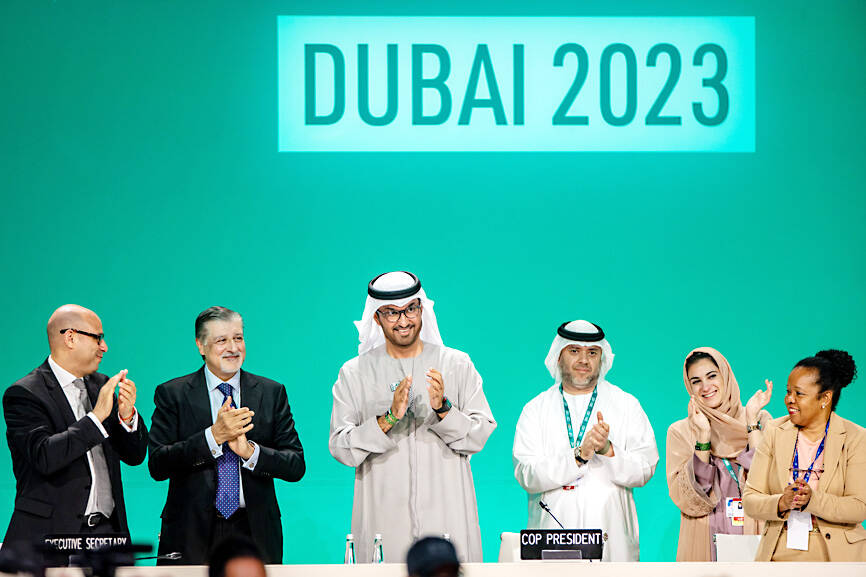The world for the first time yesterday approved a call to transition away from fossil fuels, as UN negotiations in Dubai tackled the top culprit behind climate change, but at-risk countries said far more action was needed.
After 13 days of talks and several sleepless nights in a country built on oil wealth, the Emirati president of the COP28 climate summit quickly banged a gavel to signal a consensus among 194 countries and the EU.
“You did step up, you showed flexibility, you put common interest ahead of self-interest,” said COP28 president Sultan Al Jaber, whose role as head of the United Arab Emirates’ national oil company had raised suspicion among many environmentalists.

Photo: EPA-EFE
Describing the deal as bringing “transformational change,” Al Jaber said: “We have helped restore faith and trust in multilateralism, and we have shown that humanity can come together.”
European Commissioner for Climate Action Wopke Hoekstra called the agreement “long, long overdue,” saying it had taken nearly 30 years of climate meetings to “arrive at the beginning of the end of fossil fuels.”
However, with the UN talks requiring a consensus, Al Jaber carefully calibrated the text to bring onboard countries ranging from islands that fear extinction from rising sea levels to oil giant Saudi Arabia, which led the charge to keep exporting its petroleum.
Toughening language from an earlier draft that was roundly denounced by environmentalists, the agreement calls for “transitioning away from fossil fuels in energy systems, in a just, orderly and equitable manner.”
It asks for greater action “in this critical decade” and recommits to no net greenhouse gas emissions by 2050 in the hopes of meeting the increasingly elusive goal of checking warming at 1.5°C above preindustrial levels.
The planet has already warmed by 1.2°C and scientists say this year was likely the warmest in 100,000 years, as storms, droughts and lethal wildfires expand around the world.
Marshall Islands Minister of Natural Resources and Commerce John Silk had said that the earlier draft marked a “death warrant” for his Pacific archipelago, which is just 2.1m above sea level.
Silk likened the final agreement to a “canoe with a weak and leaky hull, full of holes,” but added: “We have to put it into the water, because we have no other option.”
The small islands did not block the Dubai deal, but a representative from Samoa criticized the language as too weak after contending the group had not yet arrived in the room at Dubai’s Expo City when Al Jaber declared a consensus.
The text stopped short of backing appeals during the summit for a “phase-out” of oil, gas and coal, which together account for about three-quarters of the emissions responsible for the planetary crisis.

SECURITY: As China is ‘reshaping’ Hong Kong’s population, Taiwan must raise the eligibility threshold for applications from Hong Kongers, Chiu Chui-cheng said When Hong Kong and Macau citizens apply for residency in Taiwan, it would be under a new category that includes a “national security observation period,” Mainland Affairs Council (MAC) Minister Chiu Chui-cheng (邱垂正) said yesterday. President William Lai (賴清德) on March 13 announced 17 strategies to counter China’s aggression toward Taiwan, including incorporating national security considerations into the review process for residency applications from Hong Kong and Macau citizens. The situation in Hong Kong is constantly changing, Chiu said to media yesterday on the sidelines of the Taipei Technology Run hosted by the Taipei Neihu Technology Park Development Association. With

CARROT AND STICK: While unrelenting in its military threats, China attracted nearly 40,000 Taiwanese to over 400 business events last year Nearly 40,000 Taiwanese last year joined industry events in China, such as conferences and trade fairs, supported by the Chinese government, a study showed yesterday, as Beijing ramps up a charm offensive toward Taipei alongside military pressure. China has long taken a carrot-and-stick approach to Taiwan, threatening it with the prospect of military action while reaching out to those it believes are amenable to Beijing’s point of view. Taiwanese security officials are wary of what they see as Beijing’s influence campaigns to sway public opinion after Taipei and Beijing gradually resumed travel links halted by the COVID-19 pandemic, but the scale of

A US Marine Corps regiment equipped with Naval Strike Missiles (NSM) is set to participate in the upcoming Balikatan 25 exercise in the Luzon Strait, marking the system’s first-ever deployment in the Philippines. US and Philippine officials have separately confirmed that the Navy Marine Expeditionary Ship Interdiction System (NMESIS) — the mobile launch platform for the Naval Strike Missile — would take part in the joint exercise. The missiles are being deployed to “a strategic first island chain chokepoint” in the waters between Taiwan proper and the Philippines, US-based Naval News reported. “The Luzon Strait and Bashi Channel represent a critical access

Pope Francis is be laid to rest on Saturday after lying in state for three days in St Peter’s Basilica, where the faithful are expected to flock to pay their respects to history’s first Latin American pontiff. The cardinals met yesterday in the Vatican’s synod hall to chart the next steps before a conclave begins to choose Francis’ successor, as condolences poured in from around the world. According to current norms, the conclave must begin between May 5 and 10. The cardinals set the funeral for Saturday at 10am in St Peter’s Square, to be celebrated by the dean of the College